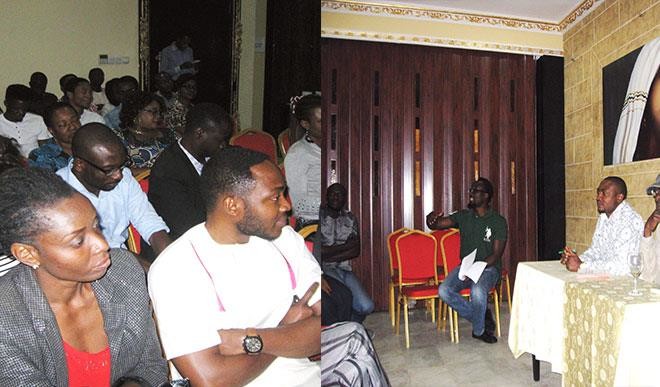Post-marital sexuality on the spot at Abuja book event
Literature buffs in Abuja were again treated to a sumptuous evening of literary offerings when Abubakar Adam Ibrahim read from ‘Season of Crimson Blossoms’ at Abuja Literary Society’s Book Jam. The Sandralia Hotel venue was packed full with literary habitués who were rewarded with Prof Kole Omotoso’s cameo on the evening ticket. The author-journalist read […]


Literature buffs in Abuja were again treated to a sumptuous evening of literary offerings when Abubakar Adam Ibrahim read from ‘Season of Crimson Blossoms’ at Abuja Literary Society’s Book Jam. The Sandralia Hotel venue was packed full with literary habitués who were rewarded with Prof Kole Omotoso’s cameo on the evening ticket.
The author-journalist read two passages from the novel about a tragic love affair between Binta, a 55-year-old widow and Reza, her 25-year-old lover and riff-raff. The author thereafter was at the receiving end of questions and comments in a role reversal of his journalism practice. In a session moderated by Dike Chukwumerije, Ibrahim gave insights into the making of the book and its Fulani cultural leitmotif.
‘Season of Crimson Blossoms’ heroine, Binta, was speaking her character to the author throughout the writing of the story as opposed to researching a real life ‘Binta.’ It is to this voice that Ibrahim would credit the story rather than himself. The book, he explained, is more about “a mirror” for the north to examine itself and “a window” for non-northerners to understand the ways of the north.
He confessed to being intrigued by society’s ways with the sexuality of widows and divorcees. An earlier comment from the audience had suggested that rather than the ethno-religious carnage in Jos, the sexuality of post-marital women was the greater social essence of the novel. This is borne out by a previous session on the book at which members of the audience confessed to having the novel trigger their contemplation of the romantic needs of their widowed mothers.
Ibrahim who turned up without his trademark muffler said that he chooses to explore the human condition as a writer instead of the topicality of an occurrence which the journalist is more concerned with. In this he aligns with the late Chinua Achebe’s stance. The Caine Prize nominee has little regard for writing workshops. Writing should be raw, he declared. But he also believes beginner-writers may derive some benefits in honing their skills at such workshops.
The interactive had dwelt much on the concept of ‘kunya,’ interpreted loosely as modesty, among the Fulani and in northern Nigeria communities. The modesty inherent in this concept sees Hajia Binta in the novel showing no affection for her eldest son, Yaro, in his lifetime only to regret this culturally-mandated detachment after the young man’s death.
Many in the audience related their experiences of this practice of parental abhorrence bothering on disdain reserved especially for the first son but often extended between siblings. This aspect of kunya could not be traced to the predominant Islamic faith of the region since it does not resonate with the rest of the Islamic world. But, just like in the book where Hajia Binta’s grandchildren enjoy more intimacy with their parents, it was observed that the practice may be on the decline among the younger generation.
Earlier, Prof Omotoso who was visiting the city had been introduced and coaxed to the table to give avuncular support to the evening’s main act. He took time to speak on his pioneering role in the Association of Nigerian Authors (ANA), and charged the present legatees of the body against nonchalance.
The South Africa-based academic recalled how he had been sacked from the University of Ibadan for teaching Arabic without being a Muslim. It was a hilarious moment for the young audience many of who wondered at how an alma mater which had taught Arabic to a non-Muslim would not let him teach it. If the audience felt scandalised at the ways of their society, more was to come in the circumstances of the senior writer’s ‘exile’ to South Africa.
He owes his exile to his book of political faction, ‘Just Before Dawn,’ which riled General Olusegun Obasanjo and invited threats to Omotoso’s life according to the professor. He also wondered at what appears to be more common with contemporary novels in Nigeria which dwell more on inter-personal relationships. According to him, his generation of writers was more concerned with issues of national politics. For a generation that straddled pre- and post-colonial political life of the country, perhaps this is to be expected.
With the two trending novels from Nigeria coming from Abuja, the city’s profile as a major literary hub seems to be on the rise. The authors of the two books, Elnathan John and Abubakar Adam Ibrahim had earlier pocketed three Caine Prize nominations between them in the last three editions of the continent’s foremost prize for the African novel.
The event, which had Elnathan John, author of ‘Born on a Tuesday,’ in attendance wound down with book signings by Ibrahim.
Ekunno is a writer and member of Abuja Literary Society.
